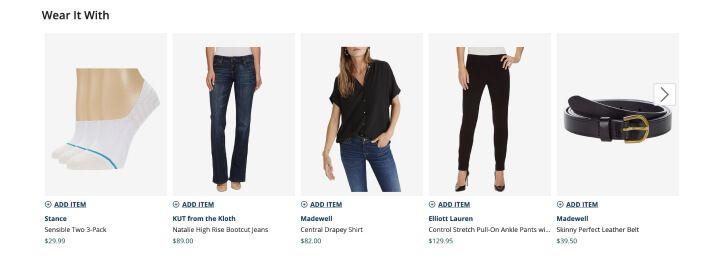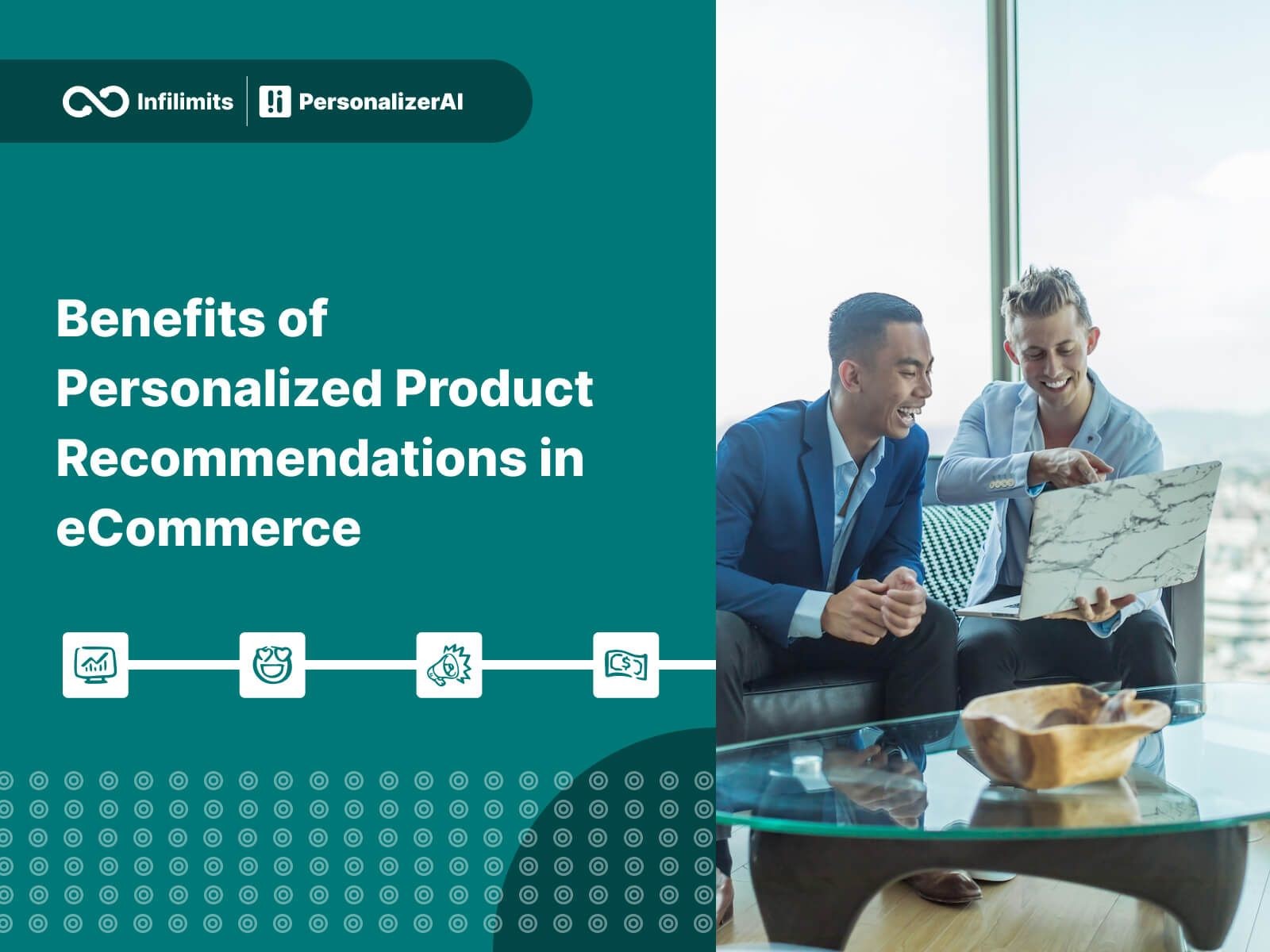What's the one thing holds the power to truly captivate and convert customers: personalization. Imagine a shopping experience where every product suggestion feels tailor-made for your unique tastes and desires. This is where personalized product recommendations step into the spotlight, revolutionizing eCommerce as we know it.
In this article, we'll delve into the significance of personalized recommendations, their role in enhancing customer experiences and the surging popularity they've gained in the eCommerce landscape.
But first,
What are personalized product recommendations?
Personalized product recommendations, at their core, are intelligent suggestions provided to shoppers based on their browsing behavior, purchase history, and individual preferences.
Instead of bombarding customers with irrelevant options, these recommendations have the remarkable ability to curate a personalized shopping journey, presenting items that perfectly align with their interests and needs.
49% of consumers said they have purchased a product that they did not initially intend to buy after receiving a personalized recommendation.
As the eCommerce industry continues to thrive, the popularity of personalized recommendations has skyrocketed. Customers are seeking seamless, efficient and enjoyable shopping experiences, where every click counts and every interaction feels meaningful.
According to Invesp’s research:
- Shoppers that clicked on recommendations are 4.5x more likely to add items to cart and complete their purchase
- 54% of retailers reported product recommendation as the key driver of the average order value in the customer purchase
- 75% of customers are more likely to buy based on personalized recommendations.
In response to this growing demand, eCommerce platforms are embracing personalization as a key strategy to engage and retain their customer base.
Recommended Reading: The Ultimate Guide to eCommerce Product Recommendations
How are personalized product recommendations so effective?
Behind the scenes, advanced machine learning algorithms and AI power the effectiveness of personalized product recommendations.
Machine learning algorithms analyze vast amounts of data, including customer browsing behavior, purchase history, and preferences. By recognizing patterns and correlations within this data, the algorithms can understand individual customer interests and make predictions about their future preferences.
This analysis enables the algorithms to generate personalized recommendations that are highly relevant to each customer.
The beauty of machine learning algorithms lies in their ability to adapt and improve recommendations over time. As customers interact with the recommendations and provide feedback, the algorithms learn from this data and refine their predictions.
The iterative process ensures that the recommendations become increasingly accurate and personalized as more data is gathered.
Benefits of Personalized Product Recommendations
eCommerce businesses can build strong customer relationships, foster brand loyalty, and encourage repeat purchases by consistently delivering relevant and valuable personalized recommendations.
The sense of being understood and catered to creates a positive association with the brand, leading to long-term customer retention and increased customer lifetime value.
To truly grasp the significance of personalized product recommendations in eCommerce, we must first understand how they elevate the customer experience. Let's explore the key reasons why personalized recommendations matter:
1. Improved relevance and relevance-to-intent matching
Personalized recommendations have a remarkable ability to align with customers' preferences and intent. By analyzing their browsing behavior and purchase history, these recommendations bring forth products that are highly relevant to their interests.
Your customers can say goodbye to wading through an overwhelming sea of options and eventually abandoning the search. With personalized recommendations, customers can discover products that resonate with their unique tastes and desires.
2. Tailored recommendations based on browsing behavior and purchase history
Personalization goes beyond just matching interests. It takes into account the individual journey of each customer. By considering their specific browsing behavior and purchase history, personalized recommendations have the power to suggest items that perfectly complement their preferences. This tailored approach creates a sense of exclusivity and makes customers feel understood and valued.
3. Repeat purchases and brand advocacy
Personalized recommendations not only improve customer satisfaction but also contribute to repeat purchases and brand advocacy. When customers receive recommendations that consistently align with their preferences, they are more likely to trust the platform's suggestions and make repeat purchases.
This repeat business is vital for eCommerce success, as it increases customer lifetime value and strengthens customer loyalty. Satisfied customers who receive personalized recommendations become advocates for your brand.
4. Reduced decision fatigue
Making purchasing decisions can be overwhelming, especially when faced with a multitude of options. Personalized recommendations alleviate decision fatigue by presenting customers with a curated set of products that align with their interests and preferences. Rather than browsing through countless options, customers can rely on the recommendations to guide their choices.
By reducing the cognitive load associated with decision-making, personalized recommendations simplify the shopping process and improve customer satisfaction.
5. Increased interaction and exploration on the website
Personalized product recommendations entice customers to spend more time on your website. As they engage with the recommended products, they are more likely to click, explore and discover additional items. This increased interaction creates a dynamic shopping experience, keeping customers engaged and immersed in your eCommerce platform.
6. Higher click-through rates and add-to-cart rates
Personalized recommendations grab customers' attention and entice them to take action. By presenting relevant products, these recommendations increase the likelihood of customers clicking on the suggested items. These recommendations significantly boost add-to-cart rates, as customers are more inclined to add items to their carts when they align with their preferences and needs.
7. Increased chances of converting browsers into buyers
Personalized product recommendations act as persuasive tools that nudge customers towards making a purchase. When customers see products that match their interests, they feel a stronger connection to those items. This connection increases the likelihood of converting casual browsers into satisfied buyers.
8. Personalized recommendations as a form of social proof and trust-building
In the online world, social proof plays a vital role in building trust. When customers see personalized recommendations that align with their interests, it reinforces the idea that others have found value in those products. This social proof creates a sense of trust and credibility, making customers more comfortable with making a purchase.
9. Cross-selling Opportunities
Personalized recommendations can suggest products that complement the item a customer is currently viewing or have previously purchased. For example, if a customer is browsing for a camera, personalized recommendations may suggest compatible lenses or camera accessories. By offering relevant and complementary products, cross-selling opportunities are created, increasing the chances of customers making additional purchases.
10. Increasing average order value by upselling
When customers see personalized recommendations for related or higher-value products, it sparks their interest and encourages them to explore further. By upselling items that align with their preferences, personalized recommendations create a seamless and convenient path for customers to add more items to their cart. This leads to increased average order value as customers are enticed to buy more than they initially intended.
11. Enhanced product discovery
Personalized recommendations play a vital role in enhancing product discovery for customers. In traditional eCommerce browsing, customers often have to navigate through extensive catalogs or use search functions to find products of interest. However, personalized recommendations eliminate this cumbersome process by proactively suggesting products that align with a customer's preferences and browsing history. By presenting a curated selection of items tailored to their individual tastes, customers are introduced to new and relevant products that they may not have discovered on their own.
12. Ability to discover relevant products and options
Personalized suggestions introduce customers to products they may have missed otherwise. By suggesting items that align with their preferences, these recommendations expand customers' options and help them discover new and exciting products. This discovery aspect enhances engagement and encourages customers to explore further.
13. Personalized shopping experiences
Personalized recommendations contribute to creating a tailored and personalized shopping experience for customers. When customers feel understood and catered to, they are more likely to stay engaged with your eCommerce platform. By analyzing customer data, such as browsing behavior, purchase history, and preferences, personalized recommendations can offer relevant and targeted suggestions that resonate with each individual customer. This level of personalization enhances the overall shopping experience, making customers feel valued and understood.
14. Enhanced customer satisfaction and loyalty through personalized experiences
When customers receive personalized recommendations that genuinely meet their needs, it creates a sense of satisfaction and delight. By offering a tailored and relevant experience, personalized recommendations foster customer loyalty. Satisfied customers are more likely to return for future purchases and recommend your eCommerce business to others.
Examples of Personalized Product Recommendations
Personalized recommendations are a powerful tool that can help ecommerce businesses increase customer engagement, conversion rates, and average order value. For businesses looking to improve their bottom line, personalized recommendations should be a top priority. Some examples of personalized product recommendations are:
1. Amazon
Amazon is one of the most successful eCommerce businesses in the world, and a big part of their success is due to their personalized recommendations. Amazon uses a variety of data points, including purchase history, browsing behavior, and search history, to generate personalized recommendations for each customer.
These recommendations are displayed prominently on the Amazon website and in their email marketing campaigns. As a result of their personalized recommendations, Amazon is able to increase customer engagement, conversion rates, and average order value.

2. Zappos
Zappos is an online retailer that is known for its excellent customer service. Zappos uses a variety of data points, including purchase history, browsing behavior, and search history, to generate personalized recommendations for each customer. Zappos uses personalized recommendations to help customers find the perfect match. They collect data on customer's shoe size, style preferences, and price range. This data is used to generate personalized recommendations for each customer.

3. Warby Parker
Warby Parker is an online eyewear retailer that uses personalized recommendations to help customers find the perfect glasses. Warby Parker collects data on customer's prescription, face shape, and style preferences. This data is used to generate personalized recommendations for each customer.

4. Everlane
Everlane is an online clothing retailer that uses personalized recommendations to help customers find the perfect clothes. They collects data on customer's size, style preferences, and price range.
Everlane's personalized recommendations are based on a variety of factors, including purchase history, browsing behavior, and search history. This allows Everlane to provide customers with recommendations that are relevant to their individual needs and interests.

Personalized product recommendations offer a multitude of benefits for eCommerce marketers and entrepreneurs. Incorporating personalized recommendations into your eCommerce strategy will not only set you apart from the competition but also deliver the personalized experiences that customers crave.
It is essential for eCommerce marketers and entrepreneurs to understand the importance of personalization in today's competitive market. By implementing personalized recommendation strategies, businesses can stay ahead of the competition, meet customer expectations and drive growth.
Recommended Reading: How To Upsell on Shopify: 10 Upselling Tips To Boost Profits
